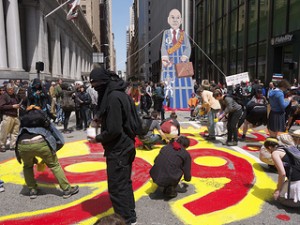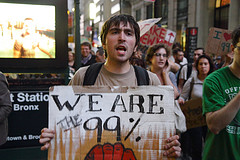
The Occupy movement’s strength is its theatrics, argues Todd Gitlin, author of Occupy Nation: The Roots, the Spirit, and the Promise of Occupy Wall Street, on the Possible Futures blog of the Social Science Research Council.
The “anarchist post-punk core” of Occupy has been more about expression than mission from its start, writes Gitlin, a professor of sociology and journalism at Columbia University. Thus, the play that took place on May Day was a natural expression of Occupy’s spirit:
Occupy, in other words, is primarily an identity movement, and identity movements face inward. They aspire to be cultures, self-sufficient and gorgeous. People don’t join Occupy, they do it. It’s a way of life, a transvaluation of values. Joining in such a life is, to a few tens of thousands of people nationwide, an intense form of disaffiliating from the main currents of American society and culture. It means not only disaffection from plutocratic control but making oneself at home with the movement’s own solidarity.
TSP and other social scientific sources are swimming in great information about the Occupy Wall Street movement, so be sure to check out some of these additional sources and add your own favorites in the comments!

